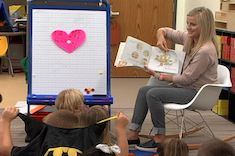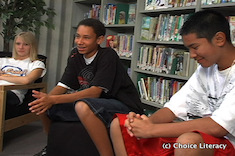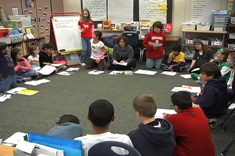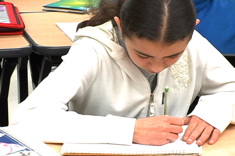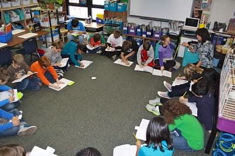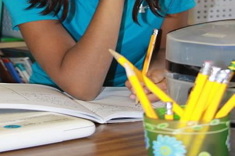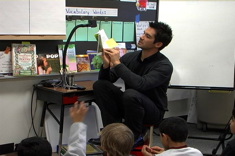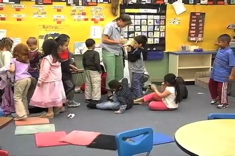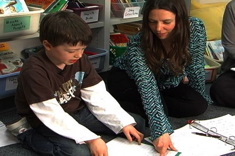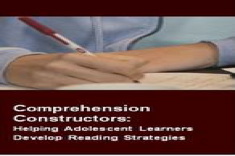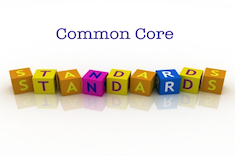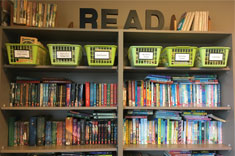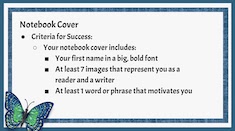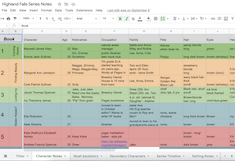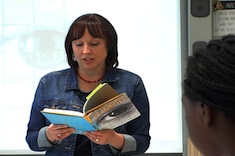10th
Latest Content
Understanding Adolescent Readers: A Podcast with Penny Kittle
In this podcast, Penny Kittle chats with Franki Sibberson about how to inspire a passion for reading in adolescents. A full transcript is available below the player.
Literacy in Content Areas: A Podcast with Penny Kittle
Penny Kittle talks with Franki Sibberson about how to help students grow as readers and writers throughout the curriculum.
Field Experience: Social-Emotional Learning in Workshop
Compassion and understanding are as important to workshop instruction as strategies and routines. Ruth Ayres compiled a field experience to highlight the way understanding the social-emotional needs of students (and ourselves) allows for safe learning environments.
Field Experience: Picture Books and Older Students
The value of picture books with older students is often questioned. Ruth Ayres assembled this field experience to allow insight into the depth and power of picture books for older students.
Educating the Writer’s Palate
Helping high school students understand the sophisticated literary tastes of writers is just a cookie away in Ellie Gilbert’s classroom. Ellie pairs cardamon with irony to launch the school year with a metaphor and challenge.
Top 10 Technology Tools for Teachers
If you're overwhelmed with the slew of new technology tools coming out all the time (and who isn't?), you might appreciate Scott Sibberson's Top 10 Tech Tools for Teachers. You are probably using some of the tools daily, and may discover a few new ones too.
High School Students Take on a Reader’s Bill of Rights
Ellie Gilbert revisits the “rights of readers” with her high school students,revising the list based on their habits and preferences. The discussion leads to some surprising additions to the list of rights. This would be a fun activity to close out the school year, or to begin a summer program with children of almost any age.
Using Animated Short Films to Teach Inference
Here’s a problem many teachers share – students are far too literal when it comes to inferring while reading. Ellie Gilbert finds animated short films readily available on the web are a terrific tool for helping students move beyond literal interpretations of text.
No More Excuses: Reading Workshops in Nontraditional Middle and High School Settings
Think you don’t have enough time for reader’s workshop in your classroom? Worried that you don’t have enough books to go around? Feel like you just don’t have the space for it? What if you had students, but no classroom, no books, and no set class times? Ellie Gilbert faced down all these challenges in her nontraditional high school reading workshop.
One Book/Four Hands: Mentoring Younger Readers Using Picture Books
Paul Hankins describes the power of pairing high school and elementary students in a partner reading program.
Read Alouds for the Last Days of School
Choice Literacy readers share some of their favorite read alouds for the last days of school.
Literacy Keepsakes to Carry Home at the End of the School Year
Choice Literacy readers share their favorite gifts for students to make and take home at the end of the year.
Writing and Publishing Book Reviews with Middle School Students
What teenager doesn't enjoy critiquing everything in the world? Erin Ocon puts that judgmental passion to good use in her classroom with a book review assignment.
More Literacy Keepsakes to Carry Home at the End of the School Year
Choice Literacy readers share more of their favorite end-of-year gifts for students to make and take home.
Beginning with the End in Mind: Planning Ahead for Closing Activities
Choice Literacy readers share their favorite end-of-year activities that circle back to events from the start of the school year.
Pencil Plans
The care and use of the lowly pencil in classrooms says a lot about what we value and our relationships with students.
Read Alouds for the First Day of School
Choice Literacy readers share their favorite read alouds for the start of the year.
A District Film Festival: Giving Kids An Authentic Audience for Their Work
Lights, cameras, and even a red carpet! Bill Bass documents how a film festival brought high school teachers and students together, with a strong focus on connecting district goals and standards to the fun projects.
Characters I Know Too Well
Books with themes of sexual abuse may be the most difficult for many of us to grapple with, if only because the issue horrifies us. Yet for some abused teens, a book may be the needed catalyst for breaking their silence about what's going on outside school. Andie Cunningham shares an annotated booklist on this tough topic.
Sarcasm Is a Useful Teaching Tool — NOT
How does sarcasm hurt students? Heather Rader counts the ways.
Getting and Giving Student Feedback
How can we help students be more reflective in our classrooms, giving us the feedback we need to make them better places for learning? Heather Rader has suggestions.
Designing Comprehension Constructors: Helping Adolescent Learners Develop Reading Strategies (E-GUIDE)
Comprehension constructors are a terrific tool for helping teens record their understanding.
The Read-Around: Raising Writers
If there was a centerpiece to teaching writing that also brought students closer together, wouldn't you want to know about it? Read on about the Read-Around.
Common Core Conversations: Increasing Argumentative Writing
Teachers continue to puzzle over and sort through the terminology in the Common Core related to opinion and persuasive writing. Amanda Adrian and Heather Rader consider terms and teaching strategies.
Panels and Pages: Using Graphic Novels in the High School Classroom
Gretchen Schroeder bolsters her students’ reading lives and deepens discussion about theme by using the rich graphic novel They Called Us Enemy as a whole-class read with her high school students. Gretchen shows how teachers can support students in deep literary analysis.
The Hermit Crab Essay: Finding a Shell to Share a Vulnerable Story
Gretchen Schroeder introduced the hermit crab essay as a creative nonfiction genre to her high school students. What began as an intriguing writing invitation led to realizing that students want to process these events through writing and that the hermit crab essay gives them a way to do so that is less daunting than just a blank page.
Setting the Room for Collaboration
Gretchen Schroeder offers advice on how to arrange a high school classroom for collaboration.
Criteria for Success
Jen Vincent shares how to create a Criteria of Success to clearly define expectations for assignments and give students independence in self-assessment.
Using Fiction Writing to Change Attitudes About Writing
Katherine Sokolowski encourages teachers to take time for students to individualize the writing process and enjoy fiction writing by engaging in National Novel Writing Month. Download the story bible as a place for students to plan their stories.
Browse Content By
Type
Category
- Assessment Tools
- Big Fresh Archives
- Booklists
- Choice Numeracy
- Classroom Design
- Common Core
- Community Building
- Conferring
- Content Literacy
- Digital Literacy
- English Language Learners
- Equity
- Family Relations
- Free Samples
- Guiding Groups
- Leadership
- Literacy Coaches
- Mentor Texts
- Minilessons
- New Teacher Mentors
- Podcasts
- Poetry
- Quote Collections
- Reading Strategies
- Self Care
- Struggling and Striving Learners
- Talking and Listening
- Teacher Study Groups
- Teaching Reading
- Teaching Writing
- Word Study and Vocabulary
Author
- Melissa Quimby
- Nawal Qarooni
- Gwen Blumberg
- Julie Cox
- The Lead Learners
- Hannah Tills
- Josie Stewart
- Ruth Metcalfe
- Mallory Messenger
- Becca Burk
- Jodie Bailey
- Vivian Chen
- Mary Brower
- Tiffany Abbott Fuller
- Stephanie Affinito
- Ruth Ayres
- Leigh Anne Eck
- Heather Fisher
- Shari Frost
- Julie Johnson
- Suzy Kaback
- Gigi McAllister
- Shirl McPhillips
- Melanie Meehan
- Cathy Mere
- Debbie Miller
- Tara Barnett and Kate Mills
- Tammy Mulligan
- Dana Murphy
- Bitsy Parks
- David Pittman
- Brenda Power
- Heather Rader
- Matt Renwick
- Mandy Robek
- Christy Rush-Levine
- Gretchen Schroeder
- Jen Schwanke
- Brian Sepe
- Katherine Sokolowski
- Stella Villalba
- Jennifer Vincent
Grade Level
Choice Literacy Membership
Articles
Get full access to all Choice Literacy article content
Videos
Get full access to all Choice Literacy video content
Courses
Access Choice Literacy course curriculum and training


